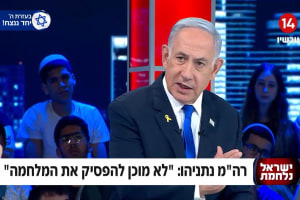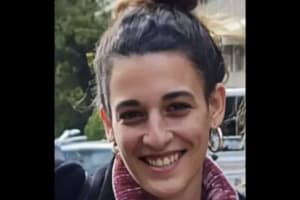Netanyahu criticizes political rivals while calling for unity; ‘We need to reduce disagreements’

In his first interview with an Israeli TV network since the start of the Gaza War, Prime Minister Benjamin Netanyahu spoke to his supporters on Sunday evening, while addressing the right-wing Channel 14 news studio audience on the “Patriots” program.
The prime minister not only spoke about the IDF’s ground operations in Gaza against Hamas terrorists and the situation on Israel’s northern border with Hezbollah forces, but also addressed the political issues facing his coalition government, including the Draft Law, anti-government protests, and the fallout of the failed judicial reform legislation last year.
Regarding the controversial ultra-Orthodox Draft Law, Netanyahu stated that “the willingness of the ultra-orthodox public to enlist changed in the wake of the war” and also noted a piece of legislation demanded by the ultra-Orthodox parties, "the Rabbi's Law," which would give the ultra-Orthodox parties more control over the appointments of municipal rabbis, and make it harder to dismiss them.
“There was no room to raise the rabbinical law even though it was in the coalition agreement, we need to unite right now," Netanyahu stressed, saying, "The proposed Draft Law is actually a unifying law that will bring thousands of the ultra-Orthodox public into the IDF.”
Netanyahu noted that the law was “prepared by Gantz and the defense ministry before the war and it recruits many thousands of members of the Haredi [ultra-Orthodox] public.”
“This is what changed in the wake of the war," he noted, "the readiness of the ultra-Orthodox public that can accept this law. It represents a historic opportunity and it brings unity.”
He called on opposition leaders to support the law for the sake of unity during the war.
“I expect those who supported the law to unite around it – like Gantz and Lapid,” Netanyahu said. “We must unite around this law, put political considerations aside, we are in the midst of an existential war. We need to reduce divisions and disagreements.”
Referring to anti-government protests and calls for new elections, even by some in the right-wing parties, Netanyahu said no one in the right wants to topple the government right now.
“No one will rush to topple a government in wartime," he clarified, "it will be a mark of Cain on the forehead of whoever does it.”
Netanyahu warned that if his government falls, “a left-wing government will be established here that will establish a Palestinian state and pass laws that will close this studio like yours.”
Referring to the decision of Benny Gantz and Gadi Eisenkot to leave the emergency government at the beginning of June, Netanyahu said, “I think that Gantz and Eisenkot did something that shouldn’t be done – they left the government in the midst of a war, and it’s not a small war.”
He denounced the current anti-government protests, saying the goal of the demonstrators is "to topple the government, and every time there’s another excuse,” referring to multiple protests on various issues over the past few years.
“I don’t think this reflects most of the nation. I appeal to most of the nation and say, 'This is the time for unity because with unity, we will win,'” Netanyahu said.
When asked if he thought that the protests and the refusal to serve by reservists led to the war, the prime minister replied, "I think that refusal has created damage, and it is a disaster and has created expectations among our enemies. It is a disaster that it comes from the left and the right. Either from here or from there, there is no refusal [to serve]. This is a disaster for the State of Israel.”
Netanyahu said the refusals and the protests were “an important factor in the Hamas offensive, but it is not the main factor. The main factor is the desire to murder Jews and hatred of Jews and the desire to uproot the Jewish nation.”

The All Israel News Staff is a team of journalists in Israel.
You might also like to read this:














